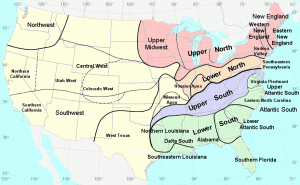Fluent in American, Beginner in Pittsburghese
Have you ever heard of Pittsburghese accent? People often think of accents as being universally applicable within each country. For example, one might generalize and say that an Australian accent is more interesting than its British counterpart. However, anyone who’s visited Dallas and Boston can attest to the fact that there are some serious differences within countries. Even “Irish,” “Scottish,” “English” and “Welsh” are too broad as each city or region in the UK has its own variation, much more so than in the U.S., where detecting the difference between a person from Seattle and someone from Indianapolis can be easier said than done.
Whether or not they are from a country or a region, accents are often accompanied by a stereotype. For example, in the US, stereotypes of Southern accents can be misplaced because a person’s social class plays a large role in their accent. It’s quite common for someone from Alabama to sound like a New Yorker. Even so, a nearly uniform and uniquely American accent can be found in the city of Pittsburgh, Pennsylvania.

This is Steelers Country

The Pittsburgh dialect is thought to be the result of heavy influence by early Scots-Irish settlers and later German and Eastern European immigrants. In terms of pronunciation, Pittsburghese immediately stands out due to its long “a” sounds. “I’m proud to live downtown” becomes “I’m prahd teh live dahntahn.” “U” sounds merge so that “pool,” “pole” and “pull” all sound identical. Locals also often use a falling intonation at the end of questions they think they already know the answer to. This means that if they see someone wearing a Cleveland jersey they may ask, “You root for the Brahns (Browns)?” with pitch rising till the last syllable and then dropping sharply, followed by a look of disgust.
Get Aht a Tahn, Yinz’ve Never Been to da Burgh?
Pittsburghese’s most notable aspect is its plural form of “you,” which comes out as “you’uns” or “yinz” and equates to the South’s “y’all” and New Jersey’s “youse.” This results in phrases like “Yinz watchin’ the Stillers tehnight?” (Are you guys watching the Steelers tonight?). Some even call Pittsburghers “Yinzers” because of this unique word. Pittsburghese also frequently adds a brief “n’at,” literally “and that,” at the end of sentences for emphasis. “He’s not home, he’s at work n’at.” Another part of Pittsburghese grammar is a tendency to drop auxiliary verbs from passive sentences, meaning that “The yard needs to be cut” becomes “The yard needs cut!” Other interesting grammar points are a positive “anymore” (“I always go shopping here anymore”) and reversal of “leave” and “let” (“Leave the kids watch TV,” “Let your coat on the hook”).
We’re Goin’ Dahn to Permanees fer Sammiches N’at
At the heart of Pittsburghese is the mountain of colorful words locals love to use. Lightly cooked eggs are “dippy eggs,” breaded and fried pork is “city chicken,” lunchmeat is “jumbo,” a nosy person is “nebby”, and a slippery street is “slippy.” Yinzers don’t clean, they “redd up the room.” A chipmunk is a “grinny,” a baby rides in a “buggy”, and candy put on cakes or ice-cream are “jimmies.”
If someone calls you a “jagoff” you know they don’t like you, and your mom might call you a “yard ape” if she sees your horsing around. Local names are also critical: da Stillers and Pens (the Steelers and Penguins), Big Ben (quarterback and local hero Ben Roethlisberger), Jayan Iggle (grocery store Giant Eagle), and Permanees (the famous Primanti Brothers sandwich shop) are just a few to know. As you can see, the passion and pride Yinzers have for their beloved city is rarely matched, but with a little practice, you too can sound like an Allegheny County born-and-raised Stillers fanatic.
Pittsburghese 101
|
Howzit goin’ dahn’ere? |
How are you? |
|
Jeetjet? |
Have you eaten yet? |
|
Gets da steppin’! |
Hurry up! |
|
Aw fer cryin’ in da sink! |
I can’t believe this! |
|
Bince… |
Being as… |
|
Bowchins |
Both of you |
|
Howscome…? |
What’s the reason…? |
|
Make a Pittsburgh Left |
Turn left at a new green light before the cars coming towards you have a chance to move |
For more information about our services visit our website: https://www.languageconnections.com/
About Language Connections:
Language Connections is one of the top language service companies in the US. Over the last 30 years, we’ve focused on providing the best business translation services, interpreting services, as well as interpreter training and customized language training programs. In addition to top-tier corporate language training, we offer certified corporate interpreters and professional business translation services in 200+ languages. Our network includes linguists with backgrounds in all major industries. They’re ready to meet your needs, whether they’re for technical translation services, legal translation, government translation services, international development translation services, education translation services, life sciences translation, or something else. Reach out to us today for a free quote on our cost-efficient and timely translation services, interpreters, or other linguistic services.
Language Connections Inc.
2001 Beacon Street, Suite 105,
Boston, MA 02135
Phone: +1-617-731-3510
Email: service@languageconnections.com

